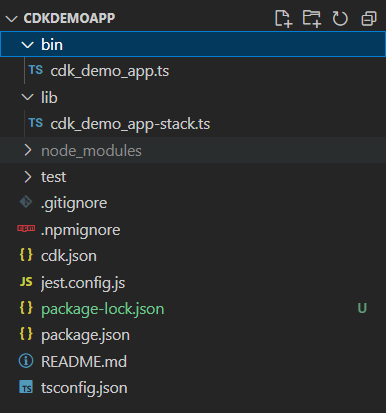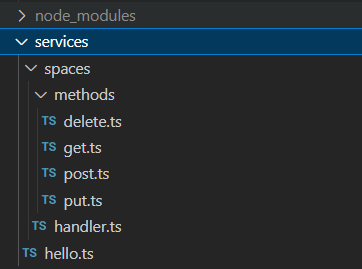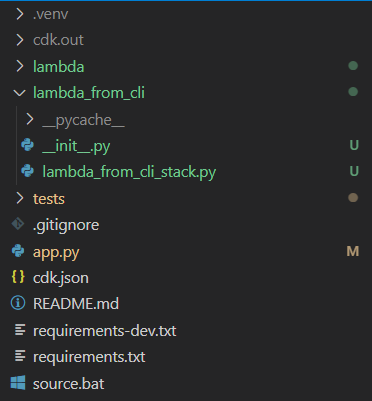Project Typescript
Initialization
-
We install
aws-cdkbynpm install -g aws-cdk -
We then init a project by
cdk init app --language typescript
Project Structure
The project structure is as follows:

As we will see,
lib/contains stack definitions of resources,bin/contains the entry point of declaring all the stacks pointed incdk.json.
Rename bin/xxx.ts to bin/launch.ts
The default name in bin/ may be misleading, which is automatically generated according to the directory we are working with.
Therefore we now rename bin/cdk_demo_app.ts into bin/launch.ts.
In cdk.json we change the app field to
"app": "npx ts-node --prefer-ts-exts bin/launch.ts"
Combining the Stack Definitions
Instead of introducing various stack definitions, we first have a overview of how we put the stack togethers in bin/launch.json:
import 'source-map-support/register'; import * as cdk from 'aws-cdk-lib'; import { LambdaStack } from '../lib/lambda-stack'; import { PhotoS3Stack } from '../lib/photo-s3-stacks'; import { APIStack } from '../lib/api-stack'; import { DataTableStack } from '../lib/data-table-stack'; const app = new cdk.App(); const photoStack = new PhotoS3Stack(app, 'photoS3Stacks'); const dataTableStack = new DataTableStack(app, "spacesTableStack"); const lambdaStack = new LambdaStack(app, 'LambdaStack', { targetBucketArn: photoStack.photoBucketName, spacesTable: dataTableStack.spaceTable }); const apiStack = new APIStack(app, "ApiStack", { helloLambdaIntegration: lambdaStack.helloLambdaIntegration, spaceLambdaIntegration: lambdaStack.spaceLambdaIntegration })
-
Lambda function will interact with S3 bucket and dynamodb, therefore we need to pass the
bucketArnandtableArnintoLambdaStackin order to grant proper policies to the automatically generated role. -
In defining various stacks we will expose the generated resource as a public field in order to share resources among different stacks.
Create Stacks of Resources
S3 (PhotoS3Stack)
import * as cdk from 'aws-cdk-lib'; import { Construct } from 'constructs'; // import * as sqs from 'aws-cdk-lib/aws-sqs'; import { Function as LambdaFunction } from "aws-cdk-lib/aws-lambda" import { Bucket } from 'aws-cdk-lib/aws-s3'; export class PhotoS3Stack extends cdk.Stack { public readonly photoBucketName: string; constructor(scope: Construct, id: string, props?: cdk.StackProps) { super(scope, id, props); const photosBucket = new Bucket(this, "photo-s3-bucket", { bucketName: "photo-buckets-for-lambda-testing" }) this.photoBucketName = photosBucket.bucketArn } }
Lambda Function (LambdaStack)
In the root directory we create a folder called service

handler --- hello.ts (List all S3 Buckets)
-
This is a simple handler which lists all s3 buckets in my account:
-
For sure we will need to allow
-
"s3:ListAllMyBuckets"and -
"s3:ListBucket"
from all related resources
-
-
We will simply use
resources: ["*"]in role policy to skip the process of finding suitable (FROM) Resource.
import { APIGatewayProxyEvent, APIGatewayProxyResult, Context } from "aws-lambda" import { S3Client, ListBucketsCommand } from "@aws-sdk/client-s3" const s3Client = new S3Client(); const handler = async (event: APIGatewayProxyEvent, context: Context) => { const command = new ListBucketsCommand({}); const listBucketResults = (await s3Client.send(command)).Buckets; const res: APIGatewayProxyResult = { statusCode: 200, body: JSON.stringify(`Here is a list of my buckets: ${listBucketResults?.map(r => r.Name).join(", ")}`) } console.log(event); return res; } export { handler }
handler --- spaces/handler.ts (CRUD with DynamoDB)
- We defer the definitions of
get,post,put,delete_functions in this post.
import { DynamoDBClient } from "@aws-sdk/client-dynamodb"; import { APIGatewayProxyEvent, APIGatewayProxyResult, Context } from "aws-lambda" import post from "./methods/post"; import get from "./methods/get"; import put from "./methods/put"; import delete_ from "./methods/delete"; const ddbClient = new DynamoDBClient({}); const handler = async (event: APIGatewayProxyEvent, context: Context): Promise<APIGatewayProxyResult> => { let message: string = ""; try { switch (event.httpMethod) { case "GET": return get(event, ddbClient); case "POST": return post(event, ddbClient); case "PUT": return put(event, ddbClient); case "DELETE": return delete_(event, ddbClient); default: break; } return res: APIGatewayProxyResult = { statusCode: 200, body: message } } catch (err) { return { statusCode: 500, body: JSON.stringify(err) } } } export { handler }
Create Stack Definition of Lambda Functions
- We defined two lambda functions inside the set stack definition.
- Although we use typescript in this project, we can create handler in any other languages.
import * as cdk from 'aws-cdk-lib'; import { Construct } from 'constructs'; // import * as sqs from 'aws-cdk-lib/aws-sqs'; import { Code, Function as LambdaFunction, Runtime } from "aws-cdk-lib/aws-lambda" import { join } from "path"; import { LambdaIntegration } from 'aws-cdk-lib/aws-apigateway'; import { Lambda } from 'aws-cdk-lib/aws-ses-actions'; import { NodejsFunction } from 'aws-cdk-lib/aws-lambda-nodejs'; import { Effect, PolicyStatement } from 'aws-cdk-lib/aws-iam'; import { ITable } from 'aws-cdk-lib/aws-dynamodb'; export class LambdaStack extends cdk.Stack { public helloLambdaIntegration: LambdaIntegration public spaceLambdaIntegration: LambdaIntegration constructor(scope: Construct, id: string, props: cdk.StackProps & { targetBucketArn: string, spacesTable: ITable }) { super(scope, id, props); // ============ start of first lambda ============ const testLambda = new NodejsFunction( this, "lambda-from-file", // id of this lambda function, { runtime: Runtime.NODEJS_18_X, handler: "handler", entry: join(__dirname, "..", "services", "hello.ts"), environment: { TARGET_BUCKET: props.targetBucketArn } } ) /** * list of all condition keys: * https://docs.aws.amazon.com/service-authorization/latest/reference/list_amazons3.html */ testLambda.addToRolePolicy(new PolicyStatement({ effect: Effect.ALLOW, actions: [ "s3:ListAllMyBuckets", "s3:ListBucket" ], resources: ["*"] })) // ============ end of first lambda ============ // ============ start of second lambda ============ const spaceLambda = new NodejsFunction( this, "space-lambda", // id of this lambda function, { runtime: Runtime.NODEJS_18_X, handler: "handler", entry: join(__dirname, "..", "services", "spaces", "handler.ts"), environment: { TABLE_NAME: props.spacesTable.tableName } } ) spaceLambda.addToRolePolicy(new PolicyStatement({ effect: Effect.ALLOW, resources: [props.spacesTable.tableArn], actions: [ "dynamodb:GetItem", "dynamodb:Scan", "dynamodb:PutItem", "dynamodb:DeleteItem" ] })) // ============ end of second lambda ============ this.helloLambdaIntegration = new LambdaIntegration(testLambda); this.spaceLambdaIntegration = new LambdaIntegration(spaceLambda); } }
API Gateway (APIStack)
export class APIStack extends cdk.Stack { constructor(scope: Construct, id: string, props: cdk.StackProps & { helloLambdaIntegration: LambdaIntegration, spaceLambdaIntegration: LambdaIntegration }) { super(scope, id, props); const api = new RestApi(this, "test-api",); const apiResources = api.root.addResource("test"); apiResources.addMethod("GET", props.helloLambdaIntegration); const spaceRouter = api.root.addResource("spaces"); spaceRouter.addMethod("GET", props.spaceLambdaIntegration); spaceRouter.addMethod("POST", props.spaceLambdaIntegration); spaceRouter.addMethod("PUT", props.spaceLambdaIntegration); spaceRouter.addMethod("DELETE", props.spaceLambdaIntegration); } }
DynamoDB (DataTableStack)
-
import * as cdk from 'aws-cdk-lib'; import { Construct } from 'constructs'; import { AttributeType, ITable, Table } from "aws-cdk-lib/aws-dynamodb"; import getSuffixFromStack from '../utils/getSuffixFromStack'; export class DataTableStack extends cdk.Stack { public spaceTable: ITable constructor(scope: Construct, id: string, props?: cdk.StackProps) { super(scope, id, props); const suffix = getSuffixFromStack(this); this.spaceTable = new Table(this, "SpacesTable", { partitionKey: { name: "id", type: AttributeType.STRING }, tableName: `SpaceStack-${suffix}`, }) } } -
Here
getSuffixFromStackis a simple util function defined byimport { Fn, Stack } from "aws-cdk-lib"; export default (stack: Stack) => { /** * exmaple of stackId: * 1:562976154517:stack/spacesTableStack/ed3f63e0-fa7b-11ee-9900-0a107562c215 */ const shortStakcId = Fn.select(2, Fn.split("/", stack.stackId)); const suffix = Fn.select(4, Fn.split("-", shortStakcId)); return suffix; }
Deployment
Deploy the Whole Stacks
-
We need to initiate a cloudformation stack definition of this project:
cdk bootstrap -
Next we need to check whether our code can generate a cloudformation definition successfully:
cdk synth -
If everything is done, we deploy our stacks by:
cdk deploy --all
Deploy Part of the Stacks
-
Note that we have defined many stacks in
launch.ts, it is possible to inspect the names of stacks bycdk listwhich yields:
photoS3Stacks spacesTableStack LambdaStack ApiStack -
Suppose we just want to reploy the
LambdaStackonly, we executecdk deploy LambdaStack
Debug a Lambda Function
.vscode/launch.json
Note that if our lambda function uses an env variable provided by other stack, then we may need to hard-code it for debugging.
{ "version": "0.2.0", "configurations": [ { "type": "node", "request": "launch", "name": "Debug Local File", "runtimeArgs": [ "-r", "ts-node/register" ], "args": [ "${relativeFile}" ], "env": { "AWS_REGION": "ap-northeast-1", "TABLE_NAME": "SpaceStack-0a107562c215" } } ] }
Write a Test File
Let's create a file test/spaces-handler-test.ts and write
import { APIGatewayProxyEvent } from "aws-lambda"; import { handler } from "../services/spaces/handler"; handler( { httpMethod: "DELETE", queryStringParameters: { id: "0206f811-3880-4065-bd5f-3a82b6e64de5" }, body: JSON.stringify({ location: "Chipi Chipi ChapaChap" }) } as any as APIGatewayProxyEvent, {} as any );
Note that handler must satisfy the interface:
import { APIGatewayProxyEvent } from "aws-lambda"; async (event: APIGatewayProxyEvent, context: Context): Promise<APIGatewayProxyResult>
Project Initialization in Python
Suppose our lambda functions are written in python, it makes sense to start the project with Python since debugging the lambda functions will be more convenient.
Initialization
First we init the project by
cdk init sample-app --language python
Project Structure

lambda/handler
It is as simple as
def handler(event, context): print(event) return { "statusCode": 200, "body": "success" }
lambda_from_cli/lambda_from_cli_stack.py (LambdaFromCliStack)
from constructs import Construct from aws_cdk import ( Duration, Stack, aws_iam as iam, aws_sqs as sqs, aws_sns as sns, aws_sns_subscriptions as subs, aws_lambda as lambda_, aws_lambda_event_sources as lambda_event_sources ) class LambdaFromCliStack(Stack): def __init__(self, scope: Construct, construct_id: str, **kwargs) -> None: super().__init__(scope, construct_id, **kwargs) queue = sqs.Queue( self, "LambdaFromCliQueue", visibility_timeout=Duration.seconds(300), ) # create lambda function sqs_lambda = lambda_.Function(self, "SQSLambda", handler="lambda_handler.handler", runtime=lambda_.Runtime.PYTHON_3_12, code=lambda_.Code.from_asset("lambda") ) # Create event source sqs_event_source = lambda_event_sources.SqsEventSource(queue) # Add SQS event soruce to lambda sqs_lambda.add_event_source(sqs_event_source)
app.py
#!/usr/bin/env python3 import aws_cdk as cdk from lambda_from_cli.lambda_from_cli_stack import LambdaFromCliStack app = cdk.App() LambdaFromCliStack(app, "LambdaFromCliStack") app.synth()